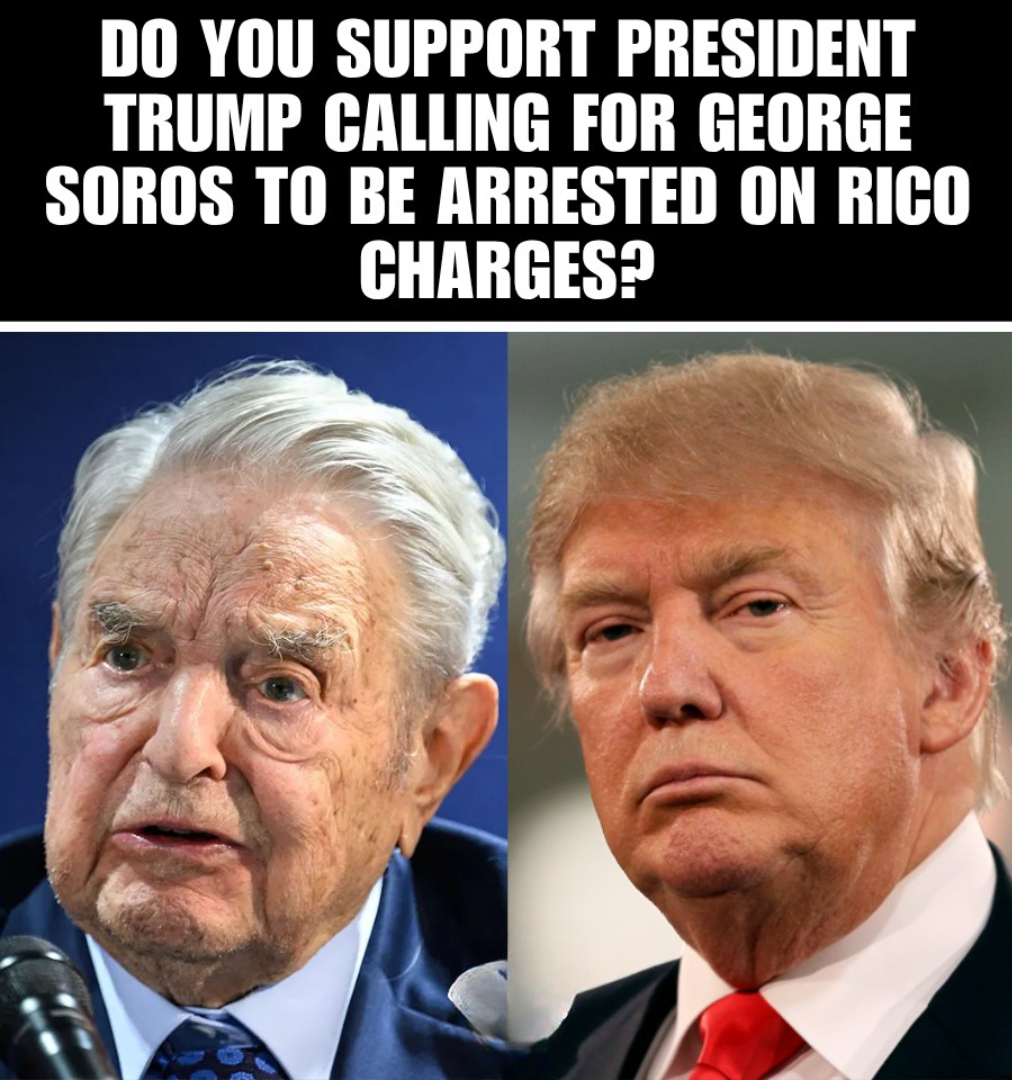The Image That Sparked a Conversation
An image circulating widely across social media in recent days poses a provocative question:
“Do you support President Trump calling for George Soros to be arrested on RICO charges?”
It’s the kind of message designed to ignite discussion — and it has.
But beyond the viral posts and heated comment sections lies a deeper issue that continues to divide American politics: how much influence should billionaires wield in shaping public policy, elections, and social movements?

A Clash of Visions
Former President Donald Trump has long criticized what he describes as the “global elite” — powerful individuals and organizations that he claims exert outsized influence over governments and media. George Soros, the billionaire investor and philanthropist known for funding liberal and progressive causes, has often been at the center of such debates.
To Trump supporters, calling for greater accountability from political donors represents a stand against corruption and double standards.
To critics, however, such calls risk turning political disagreement into personal targeting — blurring the line between legitimate scrutiny and political retribution.
What makes this moment unique is not just who is involved, but what it reveals about how Americans view power, fairness, and justice in the modern political era.
The Legal Context: What Does RICO Mean?
The reference to “RICO charges” adds another layer to the conversation.
RICO — the Racketeer Influenced and Corrupt Organizations Act — was originally designed to combat organized crime, allowing prosecutors to target groups engaged in patterns of illegal activity.
In recent years, however, RICO has entered the political vocabulary. Lawmakers and commentators have increasingly invoked it in debates over corporate misconduct, political fundraising, and government accountability.
But legal experts caution against stretching the law’s intent.
“Invoking RICO for political purposes is often more symbolic than substantive,” said constitutional attorney Ben Jacobs. “Unless there’s clear evidence of coordinated criminal activity, it remains a rhetorical weapon, not a prosecutorial tool.”
Trump’s Broader Message
For Trump’s base, his comments reflect a broader frustration with what they see as a two-tiered system of justice — one where political and financial elites are rarely held to the same standards as ordinary citizens.
Throughout his political career, Trump has positioned himself as an outsider challenging entrenched interests. Calling for investigations into influential figures fits that narrative: a populist appeal to fairness and transparency.
In campaign speeches, he often frames it this way: “If America is to remain free, no one — not even the powerful — should be above the law.”
Supporters interpret that as a rallying cry against corruption; critics view it as selective outrage.
Soros and the Power of Philanthropy
George Soros, through his Open Society Foundations, has donated billions to promote democracy, education, and human rights initiatives worldwide.
His supporters praise him as a defender of liberal values and civil freedoms; his detractors accuse him of pushing a political agenda that undermines traditional or nationalist values.
This duality has made Soros both a symbol of progressive philanthropy and a target of conservative criticism.
The debate over his influence isn’t new — it reflects a broader tension about the role of private money in shaping public outcomes.
Political analyst Marsha Cook notes:
“Soros represents the globalized model of political activism — one that uses wealth not for personal power, but to fund ideology. Whether you agree with him or not, his impact on policy and public opinion is undeniable.”
Media Reactions and Public Response
The viral nature of the image — and the question it asks — underscores how political conversation now thrives in the age of digital immediacy.
Within hours of being posted, the image drew tens of thousands of comments, shares, and dueling hashtags: #HoldThemAccountable versus #StopTheWitchHunts.
Cable networks and online outlets quickly picked up the story.
Conservative commentators framed it as an overdue reckoning with elite influence. Progressive outlets warned against the dangers of using criminal rhetoric against political opponents.
Meanwhile, independent journalists pointed out that the issue taps into a larger voter sentiment: Americans’ growing distrust in institutions — from Congress to the justice system to the media itself.
The Bigger Picture: Money, Politics, and Trust
At its core, the controversy isn’t just about Trump or Soros.
It’s about who gets to shape America’s future — and who holds them accountable.
In an era where billionaires fund political action committees, social movements, and media networks, the traditional boundaries between “public interest” and “private agenda” have blurred.
Calls for reform — from stricter campaign finance laws to transparency in nonprofit funding — are growing louder across both sides of the political spectrum.
Even some progressives agree with the conservative critique that “dark money” undermines democracy, though they differ sharply on how to address it.
As one policy researcher summarized:
“It’s not a left-vs-right issue anymore. It’s about trust — and whether people believe their voices still matter when billionaires fund both sides.”
Supporters Say…
-
Holding wealthy influencers accountable ensures fairness and transparency.
-
Political donations should face the same scrutiny as corporate lobbying.
-
Trump’s call, even if controversial, opens a necessary conversation about unequal justice.
Critics Warn…
-
Framing political opposition as criminal erodes democratic norms.
-
Selective outrage risks weaponizing the justice system for partisan goals.
-
The real solution lies in reforming campaign finance laws, not in public accusations.
Where Do You Stand?
The question raised by that viral image — “Do you support this?” — ultimately transcends personalities.
It challenges Americans to confront a difficult truth about their democracy:
How do we balance freedom, influence, and accountability when money and politics are so deeply intertwined?
For some, Trump’s call is a bold stand against a broken system.
For others, it’s a dangerous precedent that deepens division.
But perhaps the real takeaway is this:
Debate, when grounded in facts and fairness, remains the heartbeat of democracy.
Whether you agree or not, the question remains yours to answer.